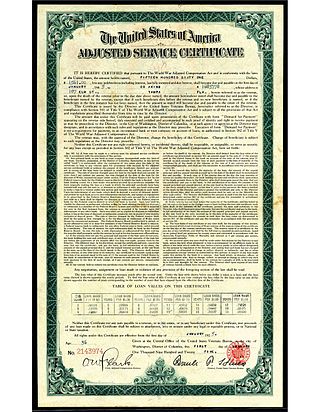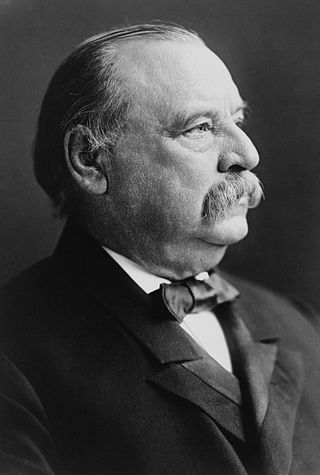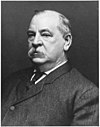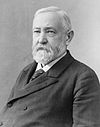Related Research Articles

Stephen Grover Cleveland was an American lawyer and politician who served as the 22nd and 24th president of the United States from 1885 to 1889 and from 1893 to 1897. In the years before his presidency, he served as a mayor and governor in New York state, winning fame as an anti-corruption crusader. Cleveland is the only president in U.S. history to serve non-consecutive presidential terms. He won the popular vote in three presidential elections—1884, 1888, and 1892. Benjamin Harrison won the electoral college vote, and thus the presidency, in 1888. Cleveland was one of two Democrats elected president in an era when Republicans dominated the presidency between 1861 and 1933.

The United States Department of Veterans Affairs (VA) is a Cabinet-level executive branch department of the federal government charged with providing lifelong healthcare services to eligible military veterans at the 170 VA medical centers and outpatient clinics located throughout the country. Non-healthcare benefits include disability compensation, vocational rehabilitation, education assistance, home loans, and life insurance. The VA also provides burial and memorial benefits to eligible veterans and family members at 135 national cemeteries.

The Grand Army of the Republic (GAR) was a fraternal organization composed of veterans of the Union Army, Union Navy, and the Marines who served in the American Civil War. It was founded in 1866 in Decatur, Illinois, and grew to include hundreds of "posts" across the North and West. It was dissolved in 1956 at the death of its last member, Albert Woolson.
According to the United States Government Accountability Office (GAO), there are 1,138 statutory provisions in which marital status is a factor in determining benefits, rights, and privileges. These rights were a key issue in the debate over federal recognition of same-sex marriage. Under the 1996 Defense of Marriage Act (DOMA), the federal government was prohibited from recognizing same-sex couples who were lawfully married under the laws of their state. The conflict between this definition and the Due Process Clause of the Fifth Amendment to the Constitution led the U.S. Supreme Court to rule DOMA unconstitutional on June 26, 2013, in the case of United States v. Windsor. DOMA was finally repealed and replaced by the Respect for Marriage Act on December 13, 2022, which retains the same statutory provisions as DOMA and extends them to interracial and same-sex married couples.

The Bonus Army was a group of 43,000 demonstrators – 17,000 veterans of U.S. involvement in World War I, their families, and affiliated groups – who gathered in Washington, D.C., in mid-1932 to demand early cash redemption of their service bonus certificates. Organizers called the demonstrators the Bonus Expeditionary Force (B.E.F.), to echo the name of World War I's American Expeditionary Forces, while the media referred to them as the "Bonus Army" or "Bonus Marchers". The demonstrators were led by Walter W. Waters, a former sergeant.
The Fair Deal was a set of proposals put forward by U.S. President Harry S. Truman to Congress in 1945 and in his January 1949 State of the Union address. More generally, the term characterizes the entire domestic agenda of the Truman administration, from 1945 to 1953. It offered new proposals to continue New Deal liberalism, but with a conservative coalition controlling Congress, only a few of its major initiatives became law and then only if they had considerable GOP support. As Richard Neustadt concludes, the most important proposals were aid to education, national health insurance, the Fair Employment Practices Commission, and repeal of the Taft–Hartley Act. They were all debated at length, then voted down. Nevertheless, enough smaller and less controversial items passed that liberals could claim some success.

Samuel Jackson Randall was an American politician from Pennsylvania who represented the Queen Village, Society Hill, and Northern Liberties neighborhoods of Philadelphia from 1863 to 1890 and served as the 29th speaker of the United States House of Representatives from 1876 to 1881. He was a contender for the Democratic Party nomination for President of the United States in 1880 and 1884.
Veterans Affairs Canada is the department within the Government of Canada with responsibility for pensions, benefits and services for war veterans, retired and still-serving members of the Canadian Armed Forces and Royal Canadian Mounted Police (RCMP), their families, as well as some civilians.

The 51st United States Congress, referred to by some critics as the Billion Dollar Congress, was a meeting of the legislative branch of the United States federal government, consisting of the United States Senate and the United States House of Representatives. It met in Washington, D.C., from March 4, 1889, to March 4, 1891, during the first two years of Benjamin Harrison's presidency.
The Economy Act of 1933, officially titled the Act of March 20, 1933, is an Act of Congress that cut the salaries of federal workers and reduced benefit payments to veterans, moves intended to reduce the federal deficit in the United States.

The Veterans Benefits Administration (VBA) is an agency of the U.S. Department of Veterans Affairs. It is responsible for administering the department's programs that provide financial and other forms of assistance to veterans, their dependents, and survivors. Major benefits include Veterans' compensation, Veterans' pension, survivors' benefits, rehabilitation and employment assistance, education assistance, home loan guaranties, and life insurance coverage.

The World War Adjusted Compensation Act, or Bonus Act, was a United States federal law passed on May 19, 1924, that granted a benefit to veterans of American military service in World War I.

Benjamin Harrison was an American lawyer and politician who served as the 23rd president of the United States from 1889 to 1893. He was a member of the Harrison family of Virginia—a grandson of the ninth president, William Henry Harrison, and a great-grandson of Benjamin Harrison V, a Founding Father.

A veteran's pension or "wartime pension" is a pension for veterans of the United States Armed Forces, who served in the military but did not qualify for military retired pay from the Armed Forces. It was established by the United States Congress and given to veterans who meet the eligibility requirements. Along with payments, they are also given additional benefits depending on their eligibility and needs.
Social security, in Australia, refers to a system of social welfare payments provided by Australian Government to eligible Australian citizens, permanent residents, and limited international visitors. These payments are almost always administered by Centrelink, a program of Services Australia. In Australia, most payments are means tested.

Benjamin Harrison's term as the president of the United States lasted from March 4, 1889, until March 4, 1893. Harrison, a Republican, took office as the 23rd United States president after defeating Democratic incumbent President Grover Cleveland in the 1888 election. Four years later he was defeated for re-election by Cleveland in the 1892 presidential election.

Social security or welfare in Finland is very comprehensive compared to what almost all other countries provide. In the late 1980s, Finland had one of the world's most advanced welfare systems, which guaranteed decent living conditions to all Finns. Created almost entirely during the first three decades after World War II, the social security system was an outgrowth of the traditional Nordic belief that the state is not inherently hostile to the well-being of its citizens and can intervene benevolently on their behalf. According to some social historians, the basis of this belief was a relatively benign history that had allowed the gradual emergence of a free and independent peasantry in the Nordic countries and had curtailed the dominance of the nobility and the subsequent formation of a powerful right wing. Finland's history was harsher than the histories of the other Nordic countries but didn't prevent the country from following their path of social development.

Grover Cleveland was president of the United States first from March 4, 1885, to March 4, 1889, and then from March 4, 1893, to March 4, 1897. The first Democrat elected after the Civil War, Cleveland is the only US president to leave office after one term and later return for a second term. His presidencies were the nation's 22nd and 24th. Cleveland defeated James G. Blaine of Maine in 1884, lost to Benjamin Harrison of Indiana in 1888, and then defeated President Harrison in 1892.

The Consolidated Appropriations Act, 2021 is a $2.3 trillion spending bill that combines $900 billion in stimulus relief for the COVID-19 pandemic in the United States with a $1.4 trillion omnibus spending bill for the 2021 federal fiscal year and prevents a government shutdown. The bill is one of the largest spending measures ever enacted, surpassing the $2.2 trillion CARES Act, enacted in March 2020. The legislation is the first bill to address the pandemic since April 2020. According to the Senate Historical Office, at 5,593 pages, the legislation is the longest bill ever passed by Congress.
References
- Glasson, William Henry (1918). Federal military pensions in the United States. Oxford University Press, American Branch. Retrieved 27 February 2013.
- Linker, Beth (2011). War's Waste: Rehabilitation in World War I America. Chicago: University of Chicago Press. ISBN 978-0-226-48253-8.
- McConnell, Stuart (1992). Glorious Contentment: The Grand Army of the Republic, 1865–1900. Chapel Hill: The University of North Carolina Press. ISBN 0-8078-2025-3.
- Quadagno, Jill (1988). The Transformation of Old Age Security. Chicago: University of Chicago Press. ISBN 0-226-69923-4.
- Zavodnyik, Peter (2011). The Rise of the Federal Colossus: The Growth of Federal Power from Lincoln to F.D.R. . Santa Barbara: Praeger. ISBN 978-0-313-39293-1.


